
In music, a single is a type of release of a song recording of fewer tracks than an album or LP record, typically one or two tracks. A single can be released for sale to the public in a variety of physical or digital formats. Singles may be standalone tracks or connected to an artist's album, and in the latter case would often have at least one single release before the album itself, called lead singles.

An Extended Play (EP) is a musical recording that contains more tracks than a single but fewer than an album or LP record. Contemporary EPs generally contain up to eight tracks and have a playing time of 15 to 30 minutes. An EP is usually less cohesive than an album and more "non-committal".

DVD-Audio is a digital format for delivering high-fidelity audio content on a DVD. DVD-Audio uses most of the storage on the disc for high-quality audio and is not intended to be a video delivery format.
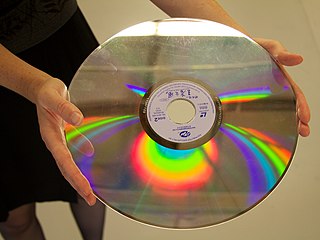
The LaserDisc (LD) is a home video format and the first commercial optical disc storage medium, initially licensed, sold and marketed as MCA DiscoVision in the United States in 1978. Its diameter typically spans 30 cm (12 in). Unlike most optical-disc standards, LaserDisc is not fully digital, and instead requires the use of analog video signals.

A double album is an audio album that spans two units of the primary medium in which it is sold, typically either records or compact disc. A double album is usually, though not always, released as such because the recording is longer than the capacity of the medium. Recording artists often think of double albums as being a single piece artistically; however, there are exceptions, such as John Lennon's Some Time in New York City and OutKast's Speakerboxxx/The Love Below . Since the advent of the compact disc, albums are sometimes released with a bonus disc featuring additional material as a supplement to the main album, with live tracks, studio out-takes, cut songs, or older unreleased material. One innovation was the inclusion of a DVD of related material with a compact disc, such as video related to the album or DVD-Audio versions of the same recordings. Some such discs were also released on a two-sided format called DualDisc.
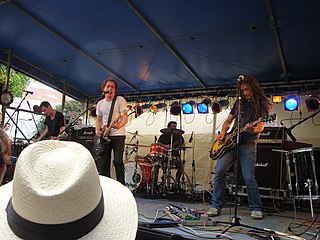
Moneen is a Canadian indie rock band from Brampton, Ontario.
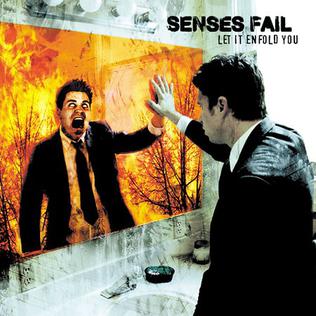
Let It Enfold You is the debut studio album by American rock band Senses Fail, released on September 7, 2004, through Vagrant Records. After finalizing their line-up, the band released their debut EP, From the Depths of Dreams, in 2002, which attracted the attention of Drive-Thru Records. The label signed Senses Fail; it had a distribution deal with MCA Records, which allowed them to acquire acts from Drive-Thru. Recording for the band's debut occurred at several studios in New Jersey in April 2003 with producer Steve Evetts. Additional recording took place at the end of the year. Described as an emo and screamo record, several of the songs on Let It Enfold You were influenced by poetry and literature.

Singles 1968–1971 is a box set compilation of singles by the Rolling Stones spanning the years 1968 to 1971. Released in 2005 by ABKCO Records, who license the Rolling Stones' 1963–1970 recorded works, Singles 1968–1971 was the third of three successive volumes to commemorate their non-LP releases during this era.

Best: First Things is the debut greatest hits album by Japanese singer Koda Kumi. Rhythm Zone released it in a variety of formats on September 21, 2005. The album is divided into two discs, each containing a single released by Koda between her 2000 debut with "Take Back" and her most recent single, "Hot Stuff" in 2005. The second disc contains four new singles: "Butterfly", "Flower", "Promise", and "Star", as well as a bonus track, the solo version of "The Meaning of Peace".

18 B Sides + DVD is a compilation album by American electronic musician Moby. The album's first disc is a CD featuring nine B-sides from his 2002 album 18, as well as four new songs. The second disc is a DVD featuring a live concert at the Pyramid Stage at the Glastonbury Festival on June 29, 2003, various outtakes and studio demos taken from the Play and 18 studio sessions, a megamix with eleven remixes of six different songs, and music videos for five singles from 18. The DVD also contains an additional non-musical feature entitled Highlights from Moby TV, consisting of several short skits.

The DVD is a digital optical disc data storage format. It was invented and developed in 1995 and first released on November 1, 1996, in Japan. The medium can store any kind of digital data and has been widely used to store video programs, software and other computer files. DVDs offer significantly higher storage capacity than compact discs (CD) while having the same dimensions. A standard single-layer DVD can store up to 4.7 GB of data, a dual-layer DVD up to 8.5 GB. Variants can store up to a maximum of 17.08 GB.
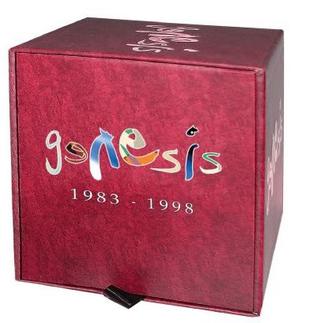
Genesis 1983–1998 is a box set of four studio albums by Genesis. It was released on 1 October 2007 in Europe & Japan by Virgin/EMI and on 20 November 2007 in North America by Atlantic/Rhino. The 5-CD/5-DVD box set includes newly remixed versions of the albums Genesis, Invisible Touch, We Can't Dance, and ...Calling All Stations.... The fifth pair of discs includes B-side songs. Each bonus DVD features audio versions of the albums in 5.1 surround sound, as well as videos for songs from that album and its corresponding tour, new interviews, and photo galleries.

The Way We Walk – Live in Concert is a 1992 live video from the We Can't Dance tour by Genesis. The footage was videotaped on 6th, 7th and 8th November 1992 at Earls Court in London, and first released on VHS on the 29th March 1993 as Genesis Live – The Way We Walk – In Concert. It was also available on PAL format LaserDisc. In November 26th 2001 the video was reissued on DVD.
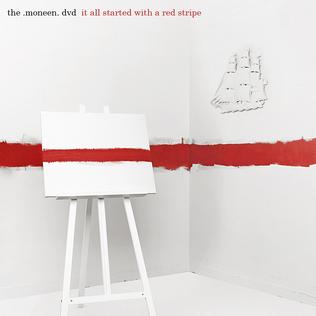
The Moneen DVD: It All Started with a Red Stripe is the first official DVD released by Moneen, an Indie rock band based in Brampton, Ontario, Canada. It was released in Canada and the United States on May 13, 2008. The DVD has four different sections: a documentary, a live performance, tour diaries and music videos.
Cunter is a five-piece hardcore punk supergroup from Brampton, Ontario whose members are from Moneen, Alexisonfire, BWC Studios and The Abandoned Hearts Club. The band motto is "All intensity, all the time," and they are known for short, ferociously intense songs.
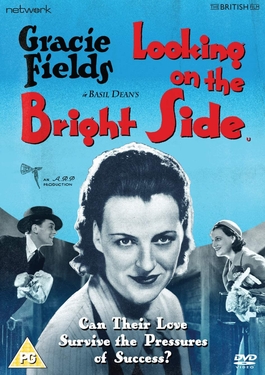
Looking on The Bright Side is a 1932 British musical comedy film It was directed by Graham Cutts and Basil Dean and starring Gracie Fields, Richard Dolman and Julian Rose.

Collection is a Japanese compilation album by South Korean girl group 2NE1. It was released on March 28, 2012, in four different editions: CD+2DVD+Photobook, CD+DVD, CD+Goods and a Regular edition. The album contains three new tracks: "Scream", "She's So " and a cover of Madonna's "Like a Virgin".

Blur 21 is a CD, DVD and vinyl box set encompassing the vast majority of music by Blur. It was released on 30 July 2012, commemorating the 21st anniversary of the release of Leisure, the band's first album. The release took place before the band's performance at Hyde Park as part of the 2012 Summer Olympics closing ceremony. One version of the box-set consists of eighteen CDs, three DVDs, one vinyl 7" record and a hardcover book acting as a complete biography of the band. The CDs contain all seven Blur albums, with the first five remastered, with each album receiving a new second disc of B-side material; as well as four 'rarities' discs containing mostly previously unreleased material. The DVDs contain Showtime, The Singles Night and an all-new rarities disc. It is the band's most complete retrospective release.

Bad 25 is the 25th anniversary edition reissue of American singer-songwriter Michael Jackson's seventh studio album Bad (1987). This is the second album by Jackson re-released on its 25th anniversary, the first being Thriller 25 (2008). Bad has sold 35 million copies worldwide, making it one of the best-selling albums of all time. Bad 25 was released on September 18, 2012, with co-operation with Epic, Legacy Recordings and MJJ Productions. Along with the original album, Bad 25 contains demo recordings recorded during the Bad era, with the deluxe edition also containing a live CD and DVD of Live at Wembley July 16, 1988, Jackson's performance at Wembley Stadium in the United Kingdom during his Bad world tour.
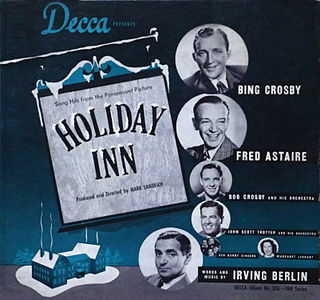
Song Hits from Holiday Inn is a studio album of phonograph records by Bing Crosby and Fred Astaire released in July 1942 featuring songs presented in the American musical film Holiday Inn. These are the longer studio recorded versions of the songs presented in the film. For the songs that were actually in the film, see Holiday Inn (soundtrack). This album is not only notable because it is one of the greatest works of the highly regarded songwriter Irving Berlin, but it is only Crosby's third studio album. This was also the first release of Crosby's signature song "White Christmas" on shellac disc record. The 1942 version would be released only one more time, in 1945's compilation album, Merry Christmas, before the song was re-recorded in 1947. The later version became the standard.



















